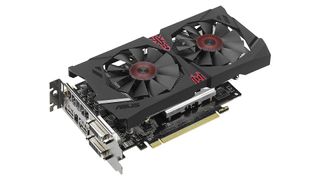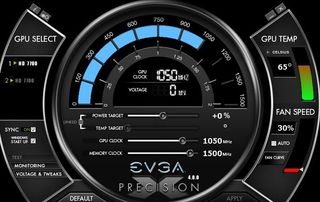I still get cold sweats thinking about the time I broke a priceless Asus graphics card
A brief history of trashing prized PC components.


This article first appeared in PC Gamer magazine issue 380 in February 2023, as part of our Tech Tales series. Every month we talk about the ups and downs of PC hardware, with a look back on our own history with the hobby.
I've broken a lot of PC components in my time, but the worst of all was the Asus graphics card. A review unit. The only one in the country, worth a bomb. The UK PR guy literally drove it from one publishing house to another, because absolutely no way was it to be trusted with a courier. No offence, DPD, but this thing had about nine trillion compute units.
I still don't know why it broke while it was in my possession. We rarely get to the bottom of it, do we? When something starts to smoke or pops or emits a grotesque noise or makes Windows melt, we're rarely offered any kind of closure. We dredge the forums for a few days, reading through the misadventures of people who had similar but frustratingly not quite the same issue we're having, before eventually giving up and sloping off to send more money to Scan.
Except this time, I couldn't do that. There was only one of these graphics cards in the country as you'll remember, and what's more we had about six pages planned out for it in that month's issue. I can't even remember what model the GPU was now—just that it was an AMD card, the size of a shoebox, and that it weighed about 25kg. And no matter what I did, up to and including reinstalling Windows, building three different test machines and then installing it into a system builder rig we were also reviewing that issue, the accursed thing would simply not make itself known to Windows.
There aren't many other of life's passions that do this to you. A car lover can crash a car, as Richard Hammond has so amply taught us over the years, but the car generally gives a bit of warning before it happens. Giving up on traction. Resisting your puny brake input. Things like that. No, PC hardware is singular in its malicious proclivity for going fatally wrong and keeping it a total secret.
With time ticking down on my doomed graphics card review—the PR was coming back for it in the morning—and the strip lights going off one by one in the deserted Future Publishing Bath offices, I finally admitted defeat and called my then-deputy editor and PC Gamer's current hardware lead, Dave James. The lead review in this current issue isn't going to be happening, I'd have to say. We'd need to find something else to fill six pages, a week away from deadline. Oh, and we'd also have to explain to Asus that I'd fried the only unit of their new super- expensive graphics card they currently had in the country. And just one more thing—the outlet expecting their review card in the morning wouldn't be getting one. OK cheers all the best bye bye bye.

Dave, vastly experienced even back then in 2011, simply shrugged it off and sympathised. "Fucked, is it? Yeah, I've had that happen a few times with review cards." And that was that. No onerous reprimand, no nothing. Dave had been in the game long enough to know that sometimes, in fact extremely often if you're a tech journalist, stuff just breaks on you.
The first thing I broke was a much more cut-and-dry scenario, though. In the olden days, PC power supplies came with two inputs, each at different voltages. As a teenager, every button and socket on my first self-built PC fascinated me. What's more, I felt I had licence to experiment with it. So one day I plugged the power lead into the lower voltage input. If I was hoping for a lower electric bill, what I got instead was a tremendous bang, a smell like the aftermath of a firework display, and several long weeks without PC gaming.
The biggest gaming news, reviews and hardware deals
Keep up to date with the most important stories and the best deals, as picked by the PC Gamer team.
It was a long journey from that first blown PSU to the expensive blown GPU. A litany of bent CPU pins, thermal paste splodges on CPU seats, aggressively depressed RAM modules and incorrectly wired front panel connectors.

But perhaps where automotive hobbyism and our own shared passion overlap is the pride we take in having broken a lot of hardware, learned from the experience, and eventually (and at great expense) developed a knowledge of how everything works. As an education route it's still cheaper than three years of uni fees, Nvidia's 5080 price pending, but it's still hard-earned.
Where would we be without having broken stuff? It's as much a part of PC gaming as having a preferred DPI or pretending to genuinely like EVE Online. Next time a BSOD appears, keep in mind that this is what we signed up for. It's the blue door towards a deeper understanding of semiconductors. Or something.
Phil 'the face' Iwaniuk used to work in magazines. Now he wanders the earth, stopping passers-by to tell them about PC games he remembers from 1998 until their polite smiles turn cold. He also makes ads. Veteran hardware smasher and game botherer of PC Format, Official PlayStation Magazine, PCGamesN, Guardian, Eurogamer, IGN, VG247, and What Gramophone? He won an award once, but he doesn't like to go on about it.
You can get rid of 'the face' bit if you like.
No -Ed.
Most Popular




